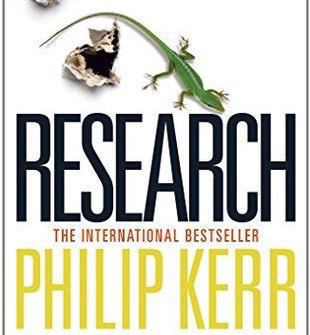
The trope of the author who becomes fantastically wealthy from writing and publishing crime fiction is a very appealing one. I’m not by any means immune to it myself, though I try hard to avoid succumbing to the dangers of wish-fulfillment. And while it’s true that there’s still a handful of thriller-writers who earn unimaginable amounts of money, it’s undeniable that the distribution of these riches is extremely unequal. For every Michael Connelly there are probably thousands — maybe tens of thousands — of writers in the same genre whom you’ve never heard of, and just as certainly never read.
Philip Kerr’s conceit is to encapsulate this disparity of earning power in the work attributed to just one author, John Houston. Houston is one of the narrators of Research, the other is one of the writers who expands on Houston’s 75-page treatments, turning the author’s research, ideas and brilliantly outlined plots into, um, actual writing, the kind of thing that can be put between the covers of airport paperbacks and sold to Houston’s loyal readership.
Houston and the other narrator, Don Irvine, are in a way friends. They share a knowledge of literature and a penchant for quoting it — just not in any of Houston’s books! When Houston’s beautiful trophy wife is murdered in their bed, leaving Houston as the only suspect, Irvine knows that the fugitive will turn to him for help. And indeed he does. Irvine then has a delicate balancing act to perform. He needs to make it appear to the Monegasque police that he is giving them his full cooperation, while protecting his sometime employer from arrest and conviction, and simultaneously turning his predicament to his own advantage.
The two narrators are self-centred, greedy, unscrupulous, cold-blooded, exploitive and manipulative. Oh, and misogynist to boot. I found them at once fascinating and appalling. They are certainly no advertisement for the idea that a liberal education and a writing career are good for the soul, to the point where I wondered whether Philip Kerr (who died too young earlier this year, but left an impressive body of work behind) had a jaundiced view of his own profession. The joint efforts of the two central characters generate enough income to keep them both comfortable but it doesn't occur to them to agree on a more-or-less equitable share-out. Instead, each tries to get into a position where he can exploit the other.
I rushed to finish the story, impatient to see how the plot would turn out. Afterwards, I commented that I had enjoyed it without actually liking it. That’s even more true of my reaction to the characters: great fun to watch, ghastly to contemplate. A couple of times in the novel, they namecheck Martin Amis. But they themselves resemble characters I’d expect to find in one of Kingsley’s books.
Originally posted on Goodreads 26-Nov-2018.